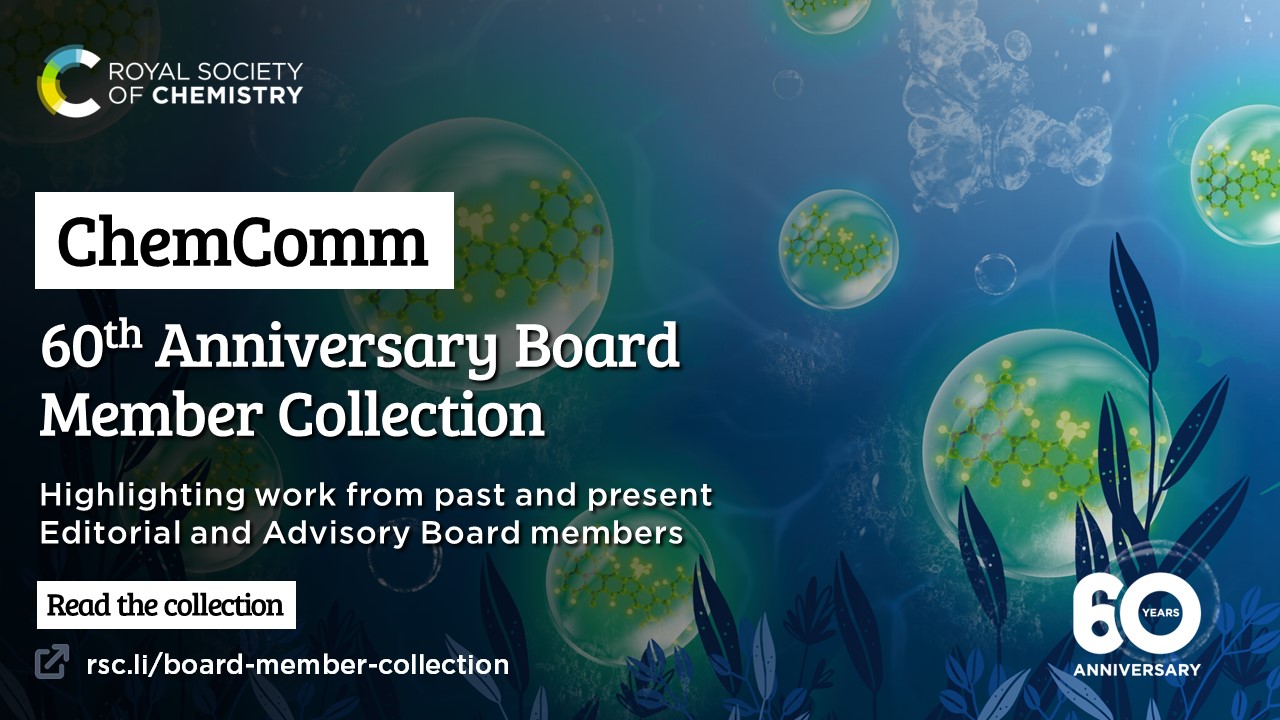Chemical Communications will be publishing its 60th volume in 2024. Over the past 60 years, ChemComm has been the RSC’s most cited journal, and one of the most trusted venues for rapid publication of short communications. In our anniversary year, we recognise the important contributions ChemComm has made, and continues to make, in advancing the chemical sciences.
As part of these celebrations, we’ve brought together a special collection highlighting the latest work from the pioneering researchers who have supported the journal in reaching this milestone by serving on ChemComm’s Editorial and Advisory boards in the last two decades. Throughout the year, we’ll be catching up with these current and former Board Members to discuss their work and reflect on ChemComm’s 60th anniversary. Check out our interviews with current and former Advisory Board members, Professor David González Rodríguez and Professor Tim Bugg below!
What attracted you to the role as Editorial Board Member for ChemComm?
In terms of scope, attractive contents, scholarly presentation and tradition in publishing excellent research results, ChemComm is clearly one of the top general chemistry journals
Read Davids’s full Open Access Communication here: Highly efficient grafting of hetero-complementary amidinium and carboxylate hydrogen-bonding/ionic pairs onto polymer surfaces by Ana M. Fernandes, Manuel C. Martos-Maldonado, Javier Araujo-Morera, Claudia Solek and David González-Rodríguez
What attracted you to the role as Editorial Board Member for ChemComm?
I had read Chem Comm as a PhD student and postdoc, and always considered it to be the flagship RSC journal, with high quality, innovative papers. It was therefore a journal that I aspired to publish in as an independent academic, and was delighted to join the Editorial Board.
How have you seen ChemComm evolve over the years, and what aspects do you find most noteworthy?
Including some Feature articles was a nice addition to the Journal, raising the profile of certain areas of research. The move to 3 page articles allowed more space for articles with complex figures, which also helped the journal.
What is your favourite thing about ChemComm?
Speed of reviewing and publication has always been something that academics really value and appreciate.
In what ways do you think ChemComm stands out among other journals in your field?
Speed of reviewing and publication, as noted above. I’ve also always found the Editorial staff helpful and knowledgeable.
Are there ways in which the journal can further support and engage with future generations of scientists?
Keep up the high standards. New areas will appear across Chemistry, but I think they can be dealt with perfectly well by the current system.
Could you provide a brief summary of your recent ChemComm publication?
The article discusses the interesting chemical mechanisms used by Nature to break down the aromatic polymer lignin found in plant biomass. Converting lignin into aromatic monomers has been a really challenging problem to solve since the 1980s when fungal lignin-oxidising enzymes were first studied, but since 2011 there has been a lot of progress in solving this problem, and developing new routes to aromatic chemicals from renewable lignin. The article sets out the major challenges in deconstructing lignin, and how they have been solved by Nature, and what the underlying Chemistry is.
In your opinion, what are the next steps or potential areas of research that could build upon the findings in this paper?
The challenge for the next 10 years is to translate these ideas into commercially viable processes that could be used industrially to convert lignin into high-value chemicals, which will require improvements in the titre of isolated products, or combining the best features of biocatalysis and chemocatalysis.
Read Tim’s Open Access Feature article here: The chemical logic of enzymatic lignin degradation by Timothy D. H. Bugg














